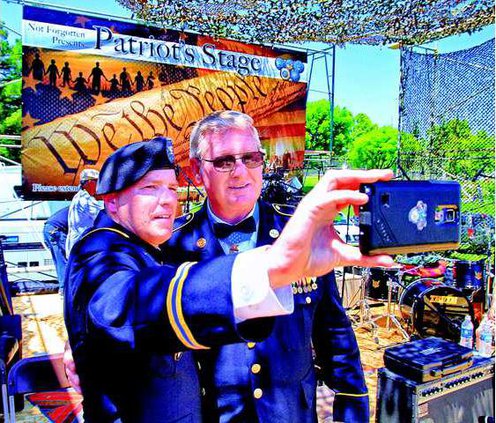The notes from Sammy Davis’ harmonica broke the silence.
Not a word was sung yet the imagery conjured up rivaled the most poignant words ever penned.
“Oh, Shenandoah, I long to see you. . .”
A sailor of perhaps 20 in his crisp Navy whites stood rigidly at attention.
“ . . . Away you rollin’ . . . river . . .”
To stage right of Davis whose heroics in the jungle of Vietnam led to him becoming a Medal of Honor recipient, stood a teen boy who had lost his father in the Global War on Terror.The teen closed his eyes and bowed his head.
“ . . . Oh Shenandoah, I long to see you . . . “
In the crowd of Gold Star families, veterans donning World War II, Korean War and Vietnam War caps and others, more than a few were dabbing their eyes, including Manteca Councilman Mike Morowit.
“. . . Away I’m bound away. . . “
Davis — who spend three years at Manteca High that included playing football as well as drums in the band — told the Memorial Weekend Commendation crowd gathered Sunday at Woodward Park of how he became a harmonica player.
Fifty years ago he had been writing his mother regularly from Vietnam but then stopped. His mother managed to get ahold of his captain. Davis, who was on the frontlines, couldn’t come up with things he felt would be appropriate to write home about. So the message got back to his mother that the absence of letters for 63 days was simply because he was bored.
One day a package came from his mother. Inside was a harmonica with a note, “I hope this helps you not be quite so bored.”
His sergeant, Johnston Dunlop, asked Davis to play “Shenandoah”.
“I played drums in high school and remembered we played ‘Shenandoah’ once but playing the drums didn’t translate too well into notes on the harmonica,” Davis recalled.
His sergeant told of how he had served in the Army and then attended William & Mary College in Virginia. While a student there Davis said Dunlop “encountered those not as patriotic as he was” alluding some were hippies and most were anti-military due to the Vietnam War.
Some of the exchanges angered Dunlop, but instead of responding he’d take every chance he could to travel 70 miles to the Shenandoah Valley where he’d find a bluff overlooking the river.
“He said it renewed his soul and gave him peace,” Davis recalled.
Dunlop after completing his degree in four years re-enlisted and found himself in Vietnam in the same platoon as Davis.
So Davis learned, over the course of several months, to play “Shenandoah” one note at a time.
Davis told the gathering he’d do it while on the perimeter keeping watch. His sergeant would occasionally come by and encourage him telling him he was getting the hang of it.
Davis eventually was able to play “Shenandoah”.
Davis came home. Sgt. Dunlop did not.
Davis was in Washington, D.C., in 1982 for the dedication of the Vietnam War memorial. He checked into his hotel but couldn’t sleep. So at 2 a.m. he put on his uniform and went to the memorial. He found Panel 50E, Row 13 and touched the name of his sergeant —Johnston Dunlap.
There were perhaps 12 other veterans milling around the wall in the wee hours of the morning looking for the names of fallen buddies when Davis took out his harmonica.
“I told Sgt. Dunlop I was playing ‘Shenandoah’ one more time hoping it would renew his soul and give him hope.”
So in the dark of the night standing by the wall, Davis played “Shenandoah”.
By the time he finished his third rendition, some 300 veterans who had been in the woods surrounding The Wall keeping guard of their fallen comrades’ names had come down to join Davis.
Not a word was spoken.
Nothing had to be said for they all understood.
More than anyone else, they understood the price of freedom.
To contact Dennis Wyatt, email dwyatt@mantecabulletin.com





